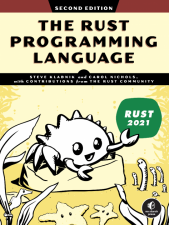"The Rust Programming Language has always been, and continues to be, the first place I point anyone looking to learn Rust. It's referred to simply as "The Book", and with good reason -- it's comprehensive and elaborate, yet friendly and thoughtful, and serves as a guide not only to the language itself, but to the principles and mental models that Rust encourages its users to adopt. The 2nd edition is a reflection of the ongoing love for the book in the community, and ensures that it will remain a solid introduction to the best Rust has to offer for years to come."
—Jon Gjengset, author of Rust for Rustaceans
"The Rust Programming Language, 2nd Edition has been improved, refined, and still remains *the book* to get started with learning Rust. Whether an experienced or a new Rustacean it's an invaluable resource on how Rust works."
—Michael Gattozzi, Senior Software Engineer at Fastly
"A great resource for mastering Rust's fundamentals. Rust is a language that rewards a deep understanding of its features, from ownership rules to pattern matching, and this book is an excellent tool to achieve that. . . . If you're thinking about seriously learning Rust, this book is for you."
—Adam Vartanian, Engineering Manager at Cord
"From a person who read the first edition front to back, the second edition of The Rust Programming Language met and exceeded my expectations! It's well-written and formatted to help introduce the reader to all the concepts of Rust. . . . Overall, this edition won't disappoint and is an excellent addition to a programmer's personal library."
—Jared Wolff, Owner, Circuit Dojo LLC
"Verdict: Recommended"
—Paul Floyd, CVu Magazine
Reviews of the first edition:
"Covers everything you could want to know about the language."
—Stack Overflow
"The book . . . provides information on how developers can get started with Rust."
—Tiera Oliver, Embedded Computing Design
"I'd learned @rustlang back in late-2019 and referred [to The Rust Programming Language]. It's written very well, and is still relevant if you want to refer to."
—Trivikram, @trivikram
"A thing of beauty in a world full of dry arcane texts."
—Garrett Mace, @macegr
"My main learning resource."
—Pawel Grzybek, @pawelgrzybek, Software Engineer
“Must Read Guide to Rust . . . Anyone that aims to learn to code in Rust should read this book.”
—C. Bruce, Amazon Reviewer





